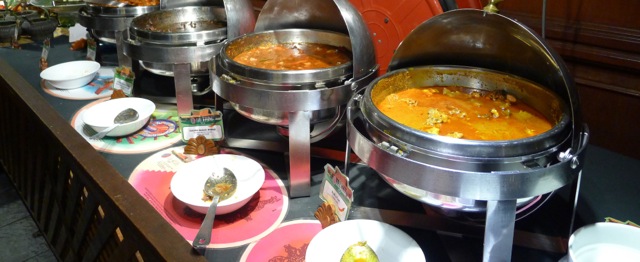|
||||||||||||||||||||||||||||

|
||||||||||||||||||||||||||||
 |
||||||||||||||||||||||||||||
|
|
||||||||||||||||||||||||||||
|
|
Issues and Manners
|
|||||||||||||||||||||||||||
|
|
We all know that the basic purpose of eating is for nourishment, but now, food is no longer a means of sustenance, but has evolved into an obsession and a status symbol. Eating, like many of our daily activities, can be a form of worship, if done properly. Conversely, it can also be something that Allah will question us about if we abuse ourselves through bad eating habits and behaviour. It is not just a matter of avoiding prohibited ingredients, but we will also be questioned about whether we have eaten in the correct and healthy way, with the purpose of enabling us to worship Allah better. |
Food, like any other provision, is a gift and a trust from Allah. Eating is a necessity, yet Allah has transformed this necessity into a pleasure for us, through the enjoyment of food and its multitude of flavours.
In today's consumer lifestyle, we are losing sight of the connection between food and worship. Many of us have taken eating to a next level, where we enjoy our food so much that it has enslaved us to certain habits and behaviour. This phenomenon is seen by the disproportionate amount of time we spend on food whether in buying or eating. Eating has now become a lifestyle choice rather than a necessity if we take stock of how we hold our regular meals, and the degree to which much of our social interaction revolves around food and drink, we will understand that we place too much emphasis on eating and drinking in our daily regime.
If left unchecked, these desires can make us formulate habits and routines which are not compatible with the Islamic way of life. When the original aim of eating is forgotten, our natural inclinations will instead make us form attachments to what we eat, and the result is that our behaviour will be guided by cravings and appetites.
The stomach is like the heart, and we reap the benefits of what we feed it. Like the heart, we can either enslave it or let it enslave us. By training our desires and being mindful of our eating habits, we keep our desire for food and drink in check.
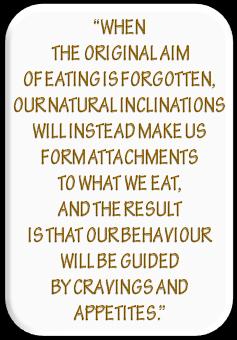 |
However, if we give in to every craving dictated by our appetites, we allow our tastebuds and stomachs to mould our habits. The more infatuated we become with food and drink, the more danger we are of nourishing our habits rather than our bodies. From this skewed sense of priority, negative aspects of behaviour can develop and influence our mannerism. If left uncontrolled, succumbing too frequently to our desire for food can make us develop traits such as greed and selfishness, and will compromise our observance of the halal and haram. Bad habits are not just limited to over eating, it also applies to what we eat and the amount of time |
The implications of such a seemingly harmless act, if corrupted, can go beyond causing health disorders, it can cause social illnesses. The more we fill the stomach out of desire rather than necessity, the more it empties theheart making us lose awareness of the more important priorities in life.
Food influences our behaviour more than we realize. For example, when we are too attached to certain kinds of food, we develop eating habits which are unrelated to Islam, but rather originate from custom. We are stuck with our own cultures without wanting to consider alternative eating habits and types of food. Instead of following the sunnah, households eat according to their heritage, to the extent that certain dishes are almost compulsory, even if the grease, spice or flavouring is detrimental to overall health. This unwillingness to break free from our hereditary eating norms breeds cultural arrogance, where each community claims that its food is the best.
In terms of time, many of us are willing to travel for hours to hunt for a delicacy, or are willing to spend time queueing up at popular restaurants instead of foregoing all that effort for a more time efficient option. There are also the long hours spent in the kitchen, cooking five dishes when only two will suffice and painstakingly crafting delicacies that will be swallowed in a few seconds. There is so much leakage of time caused by the dedication to food - time that can be better utilized for more meaningful things.
|
Another phenomenon is also developing, where people regularly share photos of what they have prepared, cooked or eaten on the social media. This is followed by dozens of comments. Have our lives become so empty, that we can waste time showing off what we eat every day, and engaging in discussions of what everybody else consumes? From a behavioural aspect, food can influence our moods. People become angry if food is not cooked in a way that they like, or is served too hot, too cold, too early or too late. They become irritable and snappy before that first cup of |
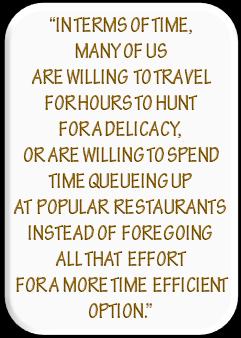 |
Getting caught in the frenzy of eating without any discipline or control creates addictions and health related issues. Obesity is becoming a problem in many developed nations, and in some countries, diabetes affects up to a third of its population. Every year, there are documented reports of people being hospitalized in the first week of Ramadan, because they disgracefully gorged themselves during iftar. There are even people who are willing to lose the benefits of their umrah and hajj in fights and arguments because the tour operator was not able serve the type of cuisine that they enjoy. How can we let our love of food affect us to this extent? Can we justify our actions if called to account by Allah? If we die because of our bad eating habits, can we tell Allah that we have treated our bodies as a trust?
The kitchen has now become a battlefield, where women are anxious to outdo each other in the championship of cooking. This is especially seen during Ramadan, where there is an added urgency to prepare as many varieties of food as possible to impress, indulge and compete with friends and neighbours.
We lose track of time during our laborious preparations and following complicated recipes for something where the enjoyment is momentary. Our palates are delighted, but the pleasure quickly disappears once the food is finished. Hence we waste hours slaving for perhaps fifteen minutes of gratification is the triumph of being praised that meaningful?
When we invite guests, we go overboard to impress them. Disregarding the sunnah of treating our guests well with what we have, without burdening ourselves, we can spend days agonizing over the perfect menu and the perfect table setting. We become excessive in displaying our generosity and mastery in the kitchen. In some cultures, it is even frowned upon to serve only adequate portions, for generosity is evidenced by the amount of leftovers on the table. We feed and serve to get praised, but will Allah praise us for our wastage of time and resources?
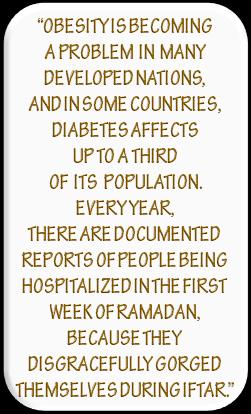 |
When we eat out, we indulge ourselves by ordering more than what we can consume. Young and old, we push our way at the buffet table. We stack our plateswith supersized portions, leaving much of the food to waste. Restaurant owners are delighted by our greed. For some others, fine dining has become a mania, and the consumption of sumptuous and overpriced dishes in trendy restaurants has become a status symbol and subject of discussion another item to add to our social media entries. The obsession of food can even harm domestic bliss arguments can erupt and feelings can get hurt if the food is not up to the taste of a spouse. For many cultures, a potential wife's ability to cook is relevant when picking a bride. |
Once we are enslaved by our appetites, we fall into the danger of transgressing the bounds of halal and haram. In the zeal for satisfying our palates, we compromise and eat ingredients which are prohibited. We are quick to give in to our temptations when we see an exotic or delicious dish, regardless of the ingredients and the manner in which it has been prepared. Instead of pleasing Allah by sacrificing our appetites and exercising patience and discipline, we prefer what looks delicious or smells good, even if there are halal alternatives. For a few minutes of enjoyment while the food passes our tastebuds, we compromise our bodies by letting it absorb substances which are haram. In doing so, we put our appetites above the obedience to Allah.
We then convince ourselves that this is not a big deal, they are just minor infractions and are harmless. However, this is not the case, as the implications are far and wide.
If someone purposely eats forbidden food, it indicates a lack of fear and respect for Allah. The absence of restraint is symptomatic of the lack of obedience. If someone does not value the commands of Allah, how can he be expected to treat anyone, including himself, with respect? If a man betrays his own self and transports his body to hellfire with the consumption of the forbidden, how can he be trusted to lead his family to jannah? If one cannot even control his appetite, how can he control other more powerful and dangerous desires?
If one has eaten forbidden food, including food purchased with a haram income, his deeds will not be accepted for 40 days. If we consistently feed ourselves with a haram diet, allowing such food to become part of our flesh and bones, how do you think it will affect our behaviour? How do you think our standing with Allah will be?
|
Our cultures have influenced our manner of eating, and while diversity is allowed in Islam, it should be within the parameters of Islam. The abuse of food can hurt us financially, influence our moods adversely, and along the way, cause us to build bad diseases and lose our good manners. We tend to forget that what we eat is all a bounty from Allah. In Islam, food is not supposed to be elaborate or luxurious. Muslims are not to satiate their appetites, but instead should leave the meal before being totally full. This leaves their minds and bodies energetic and alert in order to |
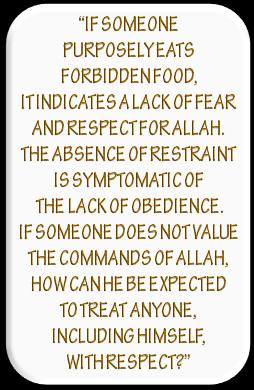 |
The Companions of the Prophet SAW were easily recognizable by their lean builds - none of them were overweight, for they were restrained in the preparation and consumption of their meals.
Where is the ummah going if we while away precious time over food - cooking, eating, buying? If we spend all our time with food, indulging in our various eating related habits and disorders, when will we have to develop our deed and to spread Islam?
In many traditional cultures, it is the duty of the women to prepare meals. In Islam, women are not the cooks, that job lies with the husband. Allocating her with such a task is not in line with the sunnah. The Prophet SAW attended to the cooking, cleaning and mending. If a woman chooses to cook, it is a charity to the husband, but it is not an obligation for her to do so.
In some traditional Asian cultures, when somebody is getting married, the criteria for the intended wife is beauty, family status, wealth - and she has to be a good cook. Being able to cook well is introduced as part of the checklist something that never existed in the time of the Prophet SAW.
Look for example at how many things we have destroyed. The man is not looking for a beautiful soul, or piety, or a wife who wants jannah, who has the desire to support her husband or to develop the nucleus of society which is the family. Her intelligence, upbringing, character and manner are second place to her ability to feed him. In turn, women are encouraged to develop cooking skills from childhood, where this is emphasized over more important core elements such as having an excellent character.
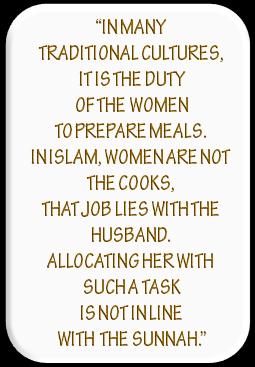 |
A common complaint of such newly wed men is that their wives are unable to cook the same way that their mothers can. This creates unnecessary friction, hurt feelings and tension in the household. Imagine the bad manner of the husband to criticize his wife for doing something that was not even her Islamic duty to begin with. Consider the impact on family structure, in the woman's role in life as a teacher of her own children, the backbone of the family, the navigator of all the affairs of the family and her role model in society. We have swapped it and diminished our purpose of life to fulfill one habit, which is eating. |
Eating in itself is not a problem. Rather, it is the addiction to habits and customs related to eating. If this has occurred, then we need to break the cycle.
From an Islamic point of view, our bodies are a trust. As the guardians of our bodies, we have the duty to maintain our health and be in good shape in order to worship Allah. We should fulfil the trust given to us, and this includes ensuring that we keep our bodies safe by observing healthy eating habits.
Islam promotes us to do everything in moderation. It encourages simplicity and frowns upon excessiveness and wastefulness. The predominant idea of eating is to give the body enough nourishment, but not so much that it causes us to neglect our worship of Allah. It does not mean that we are to eliminate all delicious flavours from our food and to just serve bone and gristle it simply means to keep things under control without transgressing any limits or abusing the bounties that Allah has bestowed on us. Mostly, Islam is about purity of the body and soul, and that purity also covers the purity of what we feed ourselves.
The following are some hints on how to simplify our eating habits and to go back to basics:
Cooking:- Buy food which is easy to cook, inexpensive and which benefits us the most nutritionally
- Spend minimal time preparing and cooking the food avoid complicated recipes or cooking processes which are time consuming
- Study the different food groups and nutritious values of different types of meats, vegetables and herbs, and apply it to your own personal circumstances (as individuals react differently depending on their gender, age and genetic characteristics)
- Avoid preparing meals which are not good for your long term health, for example, greasy food and dishes with a high sugar content
- Cook only what you need. If you find yourself constantly throwing away leftovers, it is time to reassess the amount of food that you cook
Eating:
|
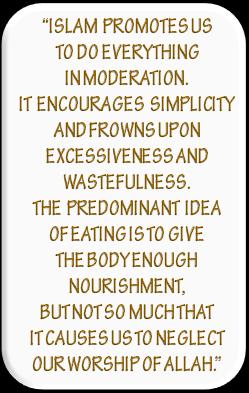 |
- The same applies to the leftovers of your children if they can't finish the food, the head of the household should try and eat the leftovers so that Allah does not lift the barakah from the household. In future, do not overfill their plates, and also instill in them the discipline to only take what they can finish
- Do not criticize your food. Rasulullah SAW never complained about what he was served, and if he found the food not to his liking, he would just refrain from taking more portions of that dish
- Avoid forming excessive attachments or addictions to specific ingredients or dishes
- Thank Allah for His bounty, generosity and kindness, even if the food is too simple for your liking. We take food for granted, whereas the presence of food, together with our ability to taste and digest it, is a blessing from Allah. Just think of the people in the world who have no idea when their next meal will be, and also of the ill people who are incapable of eating even if the most delicious food in the world are in front of them
Today, restaurants and meals serve all kinds of delicacies, while more than one third of human beings cannot find even a basic meal. Many of the wealthy abuse their food as up to two thirds of what they order or buy, ends up in the bin. This does not just happen at an individual level - observe the amount of wastage in corporate functions, wedding dinners and hotel buffets.
Let's look at the purpose of life and a long vision to society. We will find that all the massive leftovers and wastage caused by a small and wealthy segment of society, if accumulated, can feed the rest of humanity, without the wasteful feeling any difference.
The reflection of all what we're talking about is so deep it generates chronic diseases of the heart selfishness, greed, impatience. All these diseases of the heart will reflect on how we deal with others and the way we carry our goal in life, which is to be a role model to worship and invite others to the mercy and message of Islam.

If You Liked This Article, Please Download it, Print it, and Share it:
Just 'Right-Click' on the button of your choice and choose 'save target as'


